How to enable an administrator account on Windows 11
How to enable or disable an administrator account on Windows 11 using PowerShell
One of the quickest ways to enable an administrator account on Windows 11 is to use PowerShell. You can also use the newer Windows Terminal or, if you prefer, the older Command Prompt (cmd) tool.
You need to make sure you run these commands from a user account that already has administrator rights. If you are using a standard user account, you will need to switch to another user account to run this tool.
To enable an administrator account using PowerShell on Windows 11:
- Open Start by clicking the Start button or pressing the Windows key menu.
- When the Start menu opens, type powershell, right-click the top result, and select Run as administrator from the menu. Alternatively, hover over the Windows PowerShell result and select Run as administrator from the options on the right.
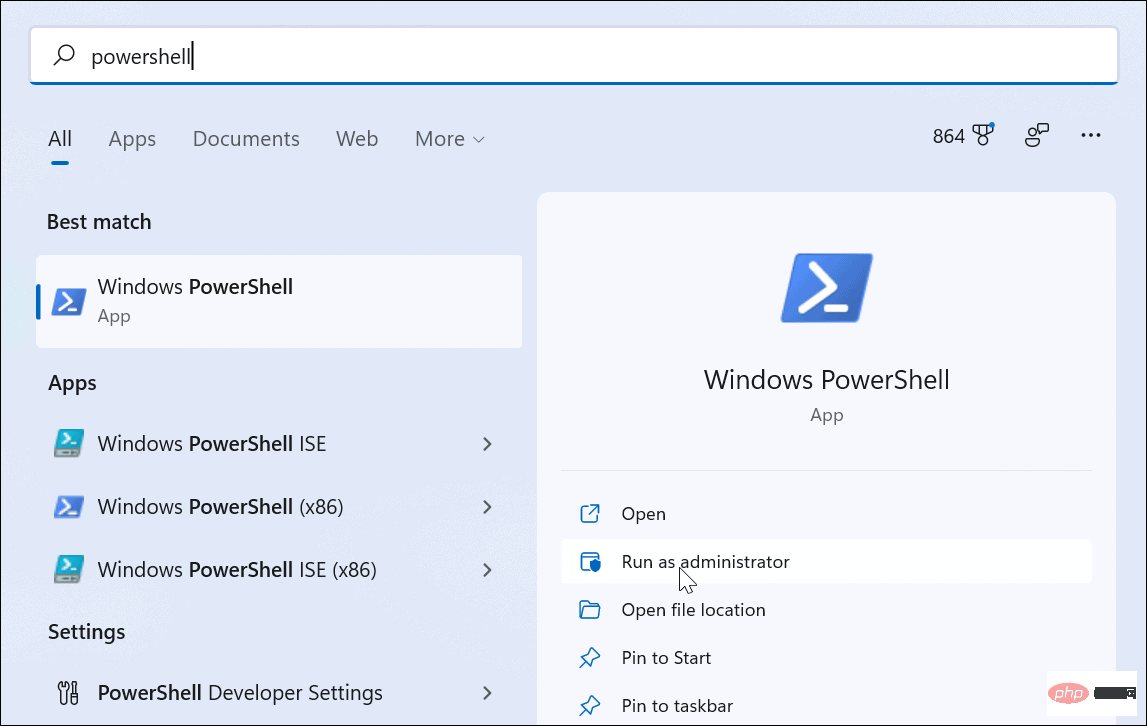
- When PowerShell starts, type the following command and press Enter:
net user administrator /active:yes
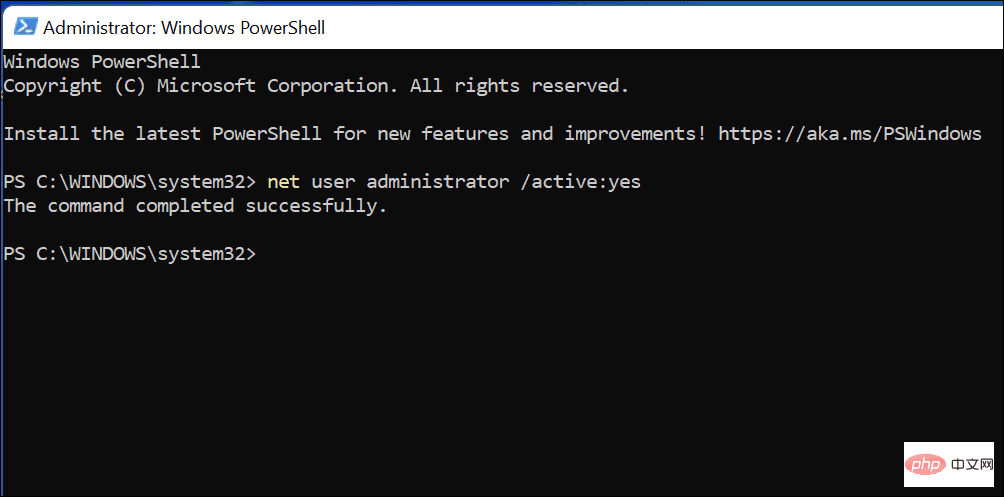
Switching to an administrator account on Windows 11
Running the net user command will immediately activate the built-in administrator account. The account will be available on the login screen.
You can double-check now by pressing Alt F4 on your keyboard, then select Switch user from the pop-up shutdown menu.
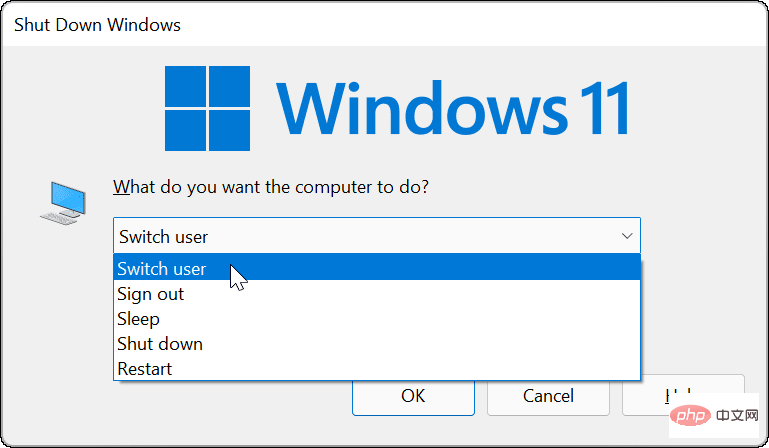
Disable the administrator account using PowerShell
We strongly recommend that you disable the default administrator account when you are done.
To do this using Windows PowerShell:
- Open the Start menu.
- Type powershell, right-click, and select Run as administrator.
- In the PowerShell window, type the following to disable the account:
net user administrator /active:no
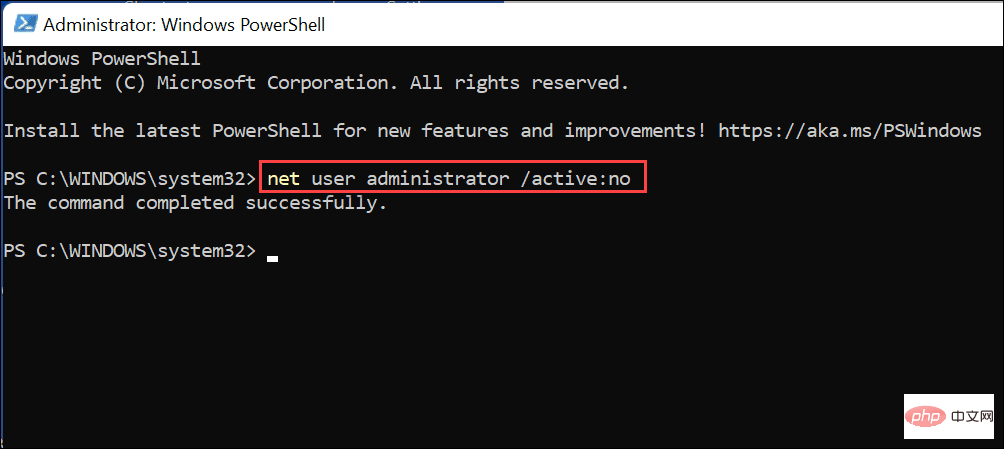
This will immediately disable the built-in administrator account. It will no longer appear on the login screen for you to use.
How to enable or disable an administrator account on Windows 11 using Computer Management
The fastest way to enable an administrator account on Windows 11 is through PowerShell or the Windows Terminal using net user Order. However, if you prefer to use a GUI tool to enable it, you can use Computer Management. This is a built-in, somewhat hidden configuration tool that allows you to change various Windows settings.
To enable an administrator account using Computer Management on Windows 11:
- Press the Start button or the Windows key to open the Start menu.
- Enter Computer Management and select the top result to open the application.
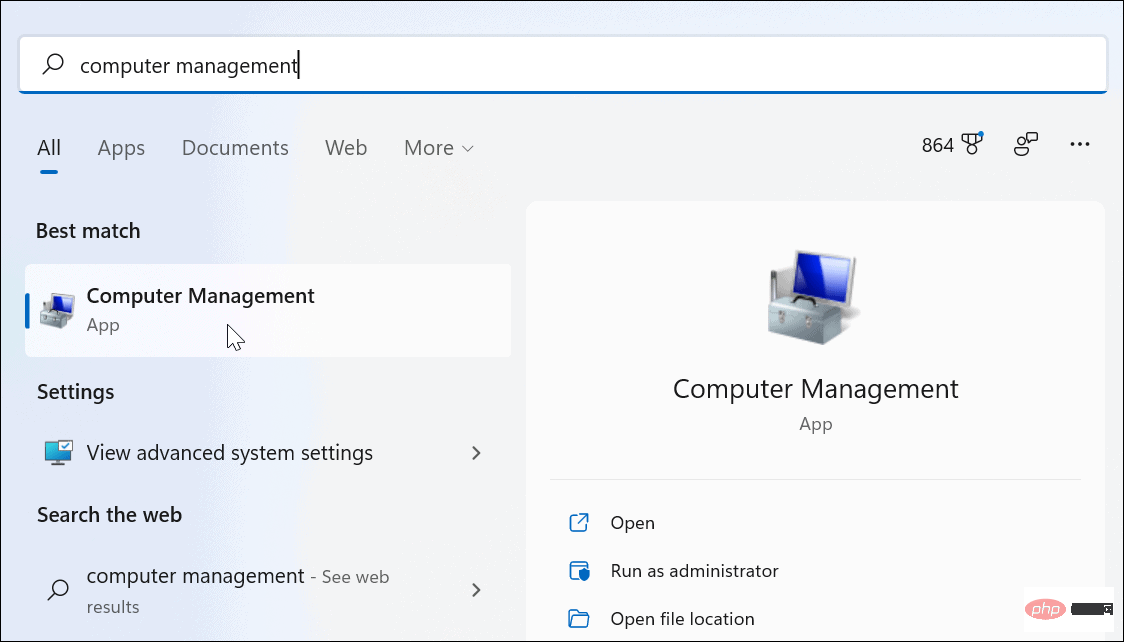
- In Computer Management, expand Local Users and Groups on the left and select Users Folder.
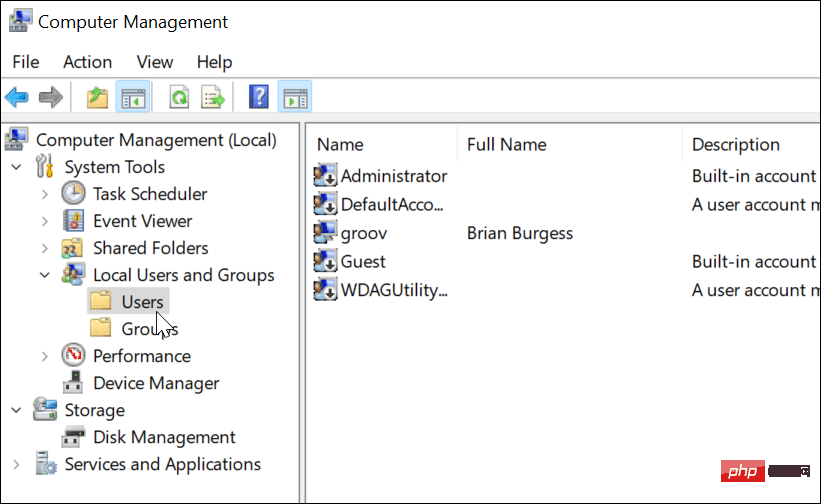
- Right-click on the Administrator account and select the Properties option.
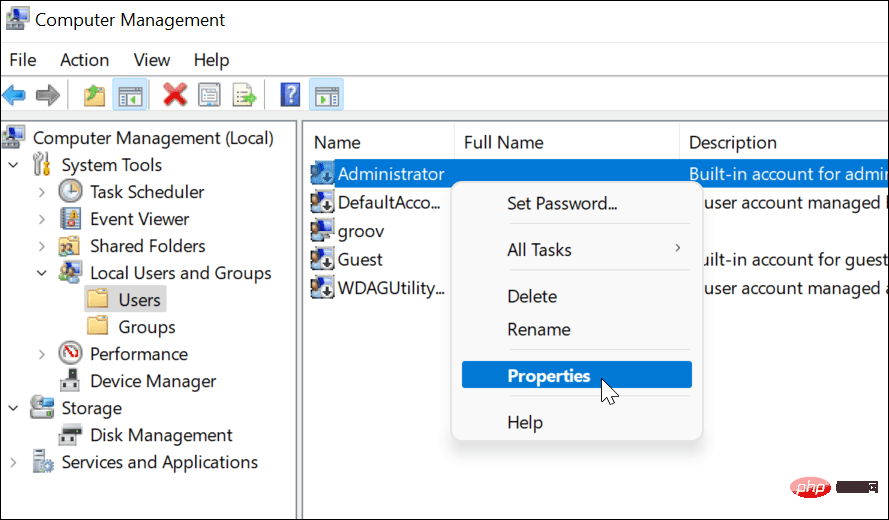
- When the Administrator Properties window appears, uncheck the Account is Disabled option.
- Press Apply and OK to save your selection.
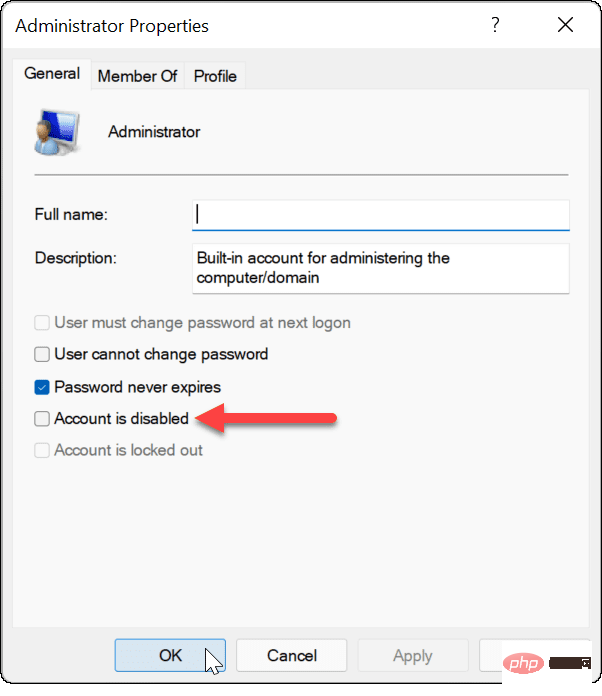
#If you have followed the steps above, the administrator account is active and accessible from the login screen.
Disable the administrator account using Computer Management
As we suggested above, you should disable your Windows 11 administrator account when you are finished using it. You can easily do this by repeating the above steps in Computer Management.
To disable the administrator account using Computer Management:
- Open the Start menu.
- Type Computer Management and select it from the search option in the Start menu.
- Open Local Users and Groups > Users on the left.
- Right-click on the Administrator account and select Properties.
- In "Properties", select the "Account is disabled" option and click "OK".
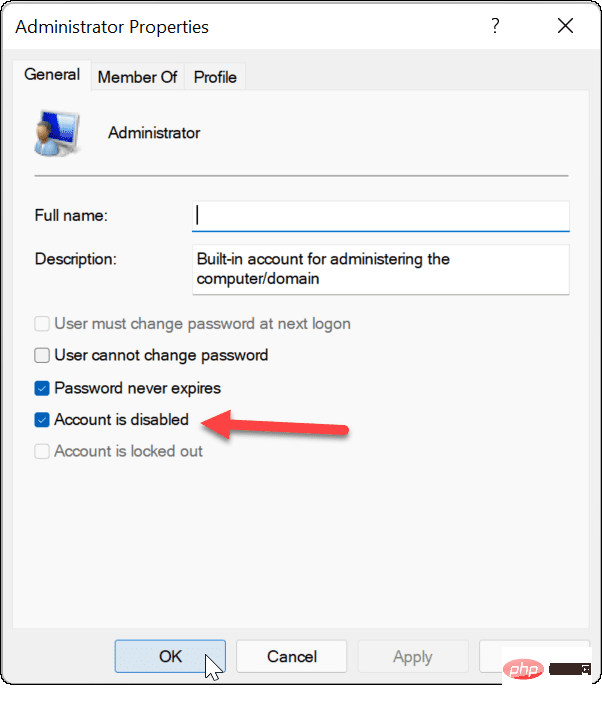
# After that, the administrator account has been closed and can no longer be accessed.
If you want to make further changes to your Windows 11 user account, you may want to consider changing your account name. If you are tired of UAC prompts on your administrator account, you can disable User Account Control. Otherwise, you can always add a local user account to Windows 11 and completely restrict administrator rights.
The above is the detailed content of How to enable an administrator account on Windows 11. For more information, please follow other related articles on the PHP Chinese website!

Hot AI Tools

Undresser.AI Undress
AI-powered app for creating realistic nude photos

AI Clothes Remover
Online AI tool for removing clothes from photos.

Undress AI Tool
Undress images for free

Clothoff.io
AI clothes remover

Video Face Swap
Swap faces in any video effortlessly with our completely free AI face swap tool!

Hot Article

Hot Tools

Notepad++7.3.1
Easy-to-use and free code editor

SublimeText3 Chinese version
Chinese version, very easy to use

Zend Studio 13.0.1
Powerful PHP integrated development environment

Dreamweaver CS6
Visual web development tools

SublimeText3 Mac version
God-level code editing software (SublimeText3)

Hot Topics
 What is the reason why PS keeps showing loading?
Apr 06, 2025 pm 06:39 PM
What is the reason why PS keeps showing loading?
Apr 06, 2025 pm 06:39 PM
PS "Loading" problems are caused by resource access or processing problems: hard disk reading speed is slow or bad: Use CrystalDiskInfo to check the hard disk health and replace the problematic hard disk. Insufficient memory: Upgrade memory to meet PS's needs for high-resolution images and complex layer processing. Graphics card drivers are outdated or corrupted: Update the drivers to optimize communication between the PS and the graphics card. File paths are too long or file names have special characters: use short paths and avoid special characters. PS's own problem: Reinstall or repair the PS installer.
 How to speed up the loading speed of PS?
Apr 06, 2025 pm 06:27 PM
How to speed up the loading speed of PS?
Apr 06, 2025 pm 06:27 PM
Solving the problem of slow Photoshop startup requires a multi-pronged approach, including: upgrading hardware (memory, solid-state drive, CPU); uninstalling outdated or incompatible plug-ins; cleaning up system garbage and excessive background programs regularly; closing irrelevant programs with caution; avoiding opening a large number of files during startup.
 How to solve the problem of loading when PS is always showing that it is loading?
Apr 06, 2025 pm 06:30 PM
How to solve the problem of loading when PS is always showing that it is loading?
Apr 06, 2025 pm 06:30 PM
PS card is "Loading"? Solutions include: checking the computer configuration (memory, hard disk, processor), cleaning hard disk fragmentation, updating the graphics card driver, adjusting PS settings, reinstalling PS, and developing good programming habits.
 Is slow PS loading related to computer configuration?
Apr 06, 2025 pm 06:24 PM
Is slow PS loading related to computer configuration?
Apr 06, 2025 pm 06:24 PM
The reason for slow PS loading is the combined impact of hardware (CPU, memory, hard disk, graphics card) and software (system, background program). Solutions include: upgrading hardware (especially replacing solid-state drives), optimizing software (cleaning up system garbage, updating drivers, checking PS settings), and processing PS files. Regular computer maintenance can also help improve PS running speed.
 How to solve the problem of loading when the PS opens the file?
Apr 06, 2025 pm 06:33 PM
How to solve the problem of loading when the PS opens the file?
Apr 06, 2025 pm 06:33 PM
"Loading" stuttering occurs when opening a file on PS. The reasons may include: too large or corrupted file, insufficient memory, slow hard disk speed, graphics card driver problems, PS version or plug-in conflicts. The solutions are: check file size and integrity, increase memory, upgrade hard disk, update graphics card driver, uninstall or disable suspicious plug-ins, and reinstall PS. This problem can be effectively solved by gradually checking and making good use of PS performance settings and developing good file management habits.
 Is PS slow loading related to other programs that are running?
Apr 06, 2025 pm 06:03 PM
Is PS slow loading related to other programs that are running?
Apr 06, 2025 pm 06:03 PM
The secrets to mastering Office software include: understanding different versions and platforms, correctly installing and configuring, proficient in using the software interface, in-depth understanding of feature operations, application collaboration and sharing functions, utilizing templates and styles, mastering advanced skills, and solving common problems. In addition, you need to choose a version that suits your needs, make good use of templates and styles, develop backup habits, and learn shortcut keys and advanced techniques to improve efficiency.
 Does mysql need the internet
Apr 08, 2025 pm 02:18 PM
Does mysql need the internet
Apr 08, 2025 pm 02:18 PM
MySQL can run without network connections for basic data storage and management. However, network connection is required for interaction with other systems, remote access, or using advanced features such as replication and clustering. Additionally, security measures (such as firewalls), performance optimization (choose the right network connection), and data backup are critical to connecting to the Internet.
 How to solve the problem of loading when PS is started?
Apr 06, 2025 pm 06:36 PM
How to solve the problem of loading when PS is started?
Apr 06, 2025 pm 06:36 PM
A PS stuck on "Loading" when booting can be caused by various reasons: Disable corrupt or conflicting plugins. Delete or rename a corrupted configuration file. Close unnecessary programs or upgrade memory to avoid insufficient memory. Upgrade to a solid-state drive to speed up hard drive reading. Reinstalling PS to repair corrupt system files or installation package issues. View error information during the startup process of error log analysis.





